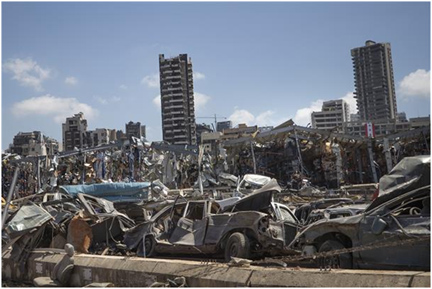Beirut (TIP): Months after a massive explosion ripped through Beirut’s port and disfigured the Lebanese capital, family members of some of the 211 people killed in the blast demanded an international probe.
It was a swift vote of no confidence in the authorities’ ability to investigate one of the largest non-nuclear explosions in history and one of the nation’s most traumatic experiences.
The skepticism was justified. Lebanon, a country wrought by political violence and assassinations, has a history of unfinished prosecutions and buried secrets. Six months after the August 4 blast, the domestic investigation has been brought to a virtual halt by the same political and confessional rivalries that thwarted past attempts to uncover the truth in major crimes. What started as an investigation into how nearly 3,000 tons of ammonium nitrate, a highly explosive fertilizer component, were stored in Beirut port for years with politicians’ and security agencies’ knowledge has taken a turn, wading into a web of murky international business interests in the explosives trade and global shipping. Government officials rebuffed an international probe and appointed former military court judge Fadi Sawwan to investigate. He has largely focused on government incompetence amid public anger at a corrupt political class blamed for Lebanon’s slide into poverty and upheaval.
In a rare move, Sawwan charged two former ministers and the current prime minister with negligence, triggering pushback.
The prime minister refused to appear for questioning, calling it “diabolic” to single him out for charges. The ministers challenged the judge and asked Lebanon’s highest court to replace him in a move that brought the probe to a halt since December 17. The interior minister said he won’t ask security forces to implement arrest warrants targeting political figures.
In early January, the Court of Cassation ruled that Sawwan can resume his investigation while it reviews calls to replace him, keeping the possibility hanging over the probe. Yet Sawwan hasn’t resumed work, raising concerns among victims’ families that he may have caved to pressure.
Dozens of family members gathered outside his house Monday, urging him to restart the probe.
“We want to know if they are not letting him,” Kayan Tleis, whose 40-year-old-brother was killed in the blast, said in reference to politicians. “This should not be like every time.”
Lebanon’s sectarian-based political factions have had a lock on power in the country for decades and have divvied up posts across the state among themselves. Though rivals, they have a common interest in preventing accountability.
Structural problems undermine the judiciary. The government and the president name judges, allowing political factions to install loyalists as rewards. Prosecutors stall, preventing cases from reaching courts.
The government also holds enormous sway over the five-member Judicial Council, a special court where it refers security and political crimes. Decisions by the government-appointed judges can’t be appealed.
Human Rights Watch said Sawwan’s appointment process was opaque and the investigation itself, so far secret, has been tainted with political interference. — AP
